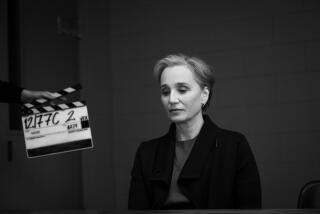Pioneering Psychology Professor Mourned
- Share via
Most of all, novelist Sherley Anne Williams remembers Charles W. Thomas for his voice. Deep and mellifluous, full of resonance and conviction, it always made an impression, she said.
She used to tell him, “If I had a voice like that, I would rule the world.”
He would always reply, “I have no interest in ruling the world, only in healing it.”
So it was with irony and “extreme sadness,” Williams said, that Thomas’ death came early Saturday. He died of multiple stab wounds, San Diego’s latest casualty in a confrontation with the ills of the world, with much of what he was trying to change.
Police say Thomas, 64, a psychologist and distinguished academician who had taught at UC San Diego since 1971, was stabbed while in his car. The vehicle was parked near an automated teller machine at the Security Pacific Bank at 4144 El Cajon Blvd. in East San Diego when Thomas was found shortly after 11 p.m. Friday.
Homicide investigators said passers-by discovered Thomas slumped over the steering wheel, asking for help. He was taken to nearby Villa View Community Hospital, where he underwent emergency surgery but died.
Police said Sunday that they know of no motive and have no suspects.
A widower whose wife died of cancer a year ago, Thomas lived in El Cajon and taught at UCSD’s Third College. He was sometimes referred to as “the father of black psychology.” His expertise was in urban and African-American culture, and his courses included “Community Dynamics and Ethnicity” and “Impact of Public Policy on Human Behavior.”
UCSD Chancellor Richard Atkinson said Sunday night that he was stunned by Thomas’ death, and called him “the developer of black psychology. He was very effective in establishing a number of positions related to how psychology should be applied in the areas of cultural diversity.
“It’s a hugely important loss to the university.”
The Rev. George Walker Smith, pastor of Christ United Presbyterian Church and chairman of the Catfish Club, a social and fraternal organization made up largely of black leaders, said he had known Thomas for almost two decades.
“He was a marvelous attribute for the community. He will be sorely missed,” Smith said. “I don’t know who can step in and fill the void that he left. He was a fearless spokesman for that which is right, as it relates to people, but particularly black people.
“He demanded and expected the best from all students, especially black students. He tried to make sure they fulfilled their potential. If something was wrong, he spoke out against it, unlike so many, who let wrongs go unattended. And in the end, he was an unfair victim of that which he stood so solidly against.”
Williams, whose fiction includes the highly acclaimed “Dessa Rose,” said Thomas had inspired her, helped to make her capable of producing such work. She said he had given her confidence at a time when she needed it. She called it “helping me to find my legs.”
She said Thomas was particularly concerned with the nation’s “devastating” drug problem, not so much what she called pat, just-say-no approaches, but with the social forces that feed the helplessness and desolation at the root of drug addiction.
“He was concerned that we look at it as a total problem,” she said. “He wanted to see that we correct the roots of drug abuse as well as capture the drug dealers.”
Williams said Thomas was always showing the young, black and gifted that they should strive for a better life, feel good about themselves and not be deterred by the racism of an often hostile culture. She and others said he bred self-esteem by preaching the virtues of independence and a strong education.
“I first met him in Los Angeles in the 1950s, and even then, he was a pioneer in his field,” she said. “At that point, there had been few psychological studies of blacks. What studies there had been emphasized pathology, as opposed to health and a positive well-being. He was a pioneer in talking about the dilemmas we face, in what went into . . . a healthy black person.”
Williams said Thomas was helpful in showing young blacks and “people of color,” as he called them, that growing up with a spirit of fraternalism and cooperation need not be in conflict with the more accepted ethos of competition.
“He taught you that you can succeed without trampling the people in your path,” she said.
One of his students was Irma Munoz, a San Diego political activist who became active in the Democratic Party. Munoz said that, as a student at UCSD in the mid-’70s, she was “mentored” by Thomas.
Munoz said Thomas was a demanding professor who believed in his students to an extraordinary degree. She said that, shortly after she met him, he researched her academic performance before coming to UCSD and told her what she had to do to improve.
Munoz said the only puzzling aspect of Thomas’ character was his membership in the Republican Party. So, around the last time she saw him, at a Third College graduation at UCSD in June, she asked him about the GOP.
“He told me it was one way to make sure the Democrats didn’t take African-Americans for granted,” she said. “He always used to say, ‘Don’t mourn, organize.’ He challenged me at all levels, as he did so many people, and now, I just can’t believe he’s gone. It’s an incredible waste of life.”
More to Read
Sign up for Essential California
The most important California stories and recommendations in your inbox every morning.
You may occasionally receive promotional content from the Los Angeles Times.













